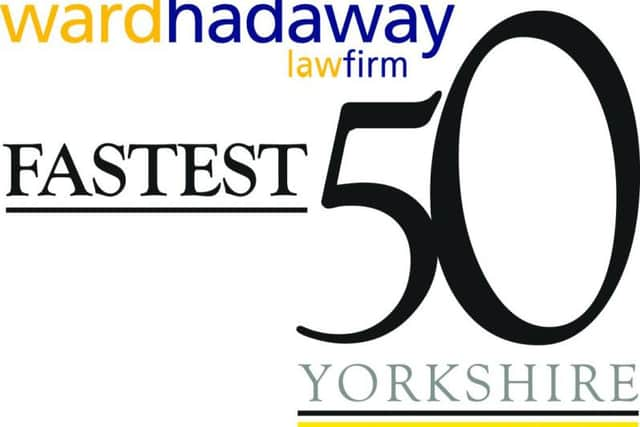Uncertainty in EU referendum means vote will go to the wire


Commercial lawyers at Ward Hadaway in Leeds say many factors in the debate on the UK staying in the EU or leaving are uncertain so that it makes it difficult to ascertain the effects of a departure on the Yorkshire economy and businesses.
The comments come as the build-up continues to the Ward Hadaway Yorkshire Fastest 50, the annual run-down of the fastest growing privately owned companies in Yorkshire which Ward Hadaway sponsors and organises in association with The Yorkshire Post.
Advertisement
Hide AdAdvertisement
Hide AdAndrea Vero, associate in the Commercial Team at Ward Hadaway, advises a range of national and international companies from a broad variety of sectors on their commercial agreements.


Ms Vero, who is also a qualified German lawyer and fluent German speaker, says the unprecedented nature of the forthcoming referendum makes it difficult to say with certainty how business will be affected in the medium and long term should the UK decide to leave the EU.
She explained: “While the UK did hold a referendum in 1975 on membership of the European Economic Community, in which the public overwhelmingly voted to remain part of the EEC, at that time the EEC was more of a trading body whereas the current EU has far greater influence on national laws and sovereignty.
“Of course, those in favour of the UK leaving the EU argue that a “Brexit” will allow the UK to regain control of its policies, conduct its own trade negotiations and save a sizable membership fee, but since no full member has ever left the Union, it is hard to chart the precise effects of a UK withdrawal or the shape of any future trade agreements.
Advertisement
Hide AdAdvertisement
Hide Ad“This may be one of the reasons why surveys on people’s voting intentions have so far proved inconclusive – and why the debate is likely to continue right up until the vote happens. However, any situation that makes it harder, more complex or most costly to trade within the EU will have a detrimental effect on businesses who trade a lot within the EU or who have European parent companies or subsidiaries.”


If the UK were to leave the EU, what would replace its current trading arrangements? The debate has thrown up a number of alternatives including membership of the European Economic Area (EEA) or individually negotiated trade agreements.
How would these affect legal and trading agreements?
Ms Vero said: “Whilst the UK would regain its sovereignty and would not have to pay a formal EU membership fee, membership of the EEA would currently mean having to adopt legislation associated with the single market including social and employment law, competition law, state aid rules and consumer and environmental protection measures without having a say on how these laws are made.
“There may also be trade barriers because after an EU exit, UK products are likely to be subject to “Rules of Origin” which means that they would face EU tariffs if components or supply chains do not meet single market requirements. All of this currently applies to non-EU EEA members such as Norway and Switzerland, which are bound to adopt EU policies on a wide range of issues without being an EU member and without having any voting rights. Additionally, these countries make “voluntary” payments to the EU to support its poorest member states, although these are on a reduced level.”
Advertisement
Hide AdAdvertisement
Hide AdA number of those in favour of a UK exit would prefer to see the UK negotiate independent bilateral free trade agreements with up-and-coming overseas markets rather than lengthy negotiations carried out at EU level.
Ms Vero said: “Trade treaties do take a long time to negotiate and years more to come fully into force. Furthermore, free trade deals are never fully free in the sense of completely open borders; each country will always protect and safeguard its particular interest.
“None of the EU member states is unilaterally entitled to negotiate and enter into bilateral free trade agreements with non-EU countries. As all external trade relationships are coordinated at EU level, the UK after a Brexit would have to negotiate a new trade deal with the EU in order to benefit from advantageous trading arrangements. It can only be speculated how willing the EU is to negotiate with an ex-member state that has decided it no longer wants to be part of the club. Given that the EU is still Britain’s largest import and export market, this is likely to have serious consequences for UK businesses.
“In the interim, UK companies which have existing contractual obligations with companies from other EU member states will need to assess how an exit from the EU will affect these obligations; for example in terms of customs obligations and import and export duties.
Advertisement
Hide AdAdvertisement
Hide Ad“There is also the consideration that a large number of UK laws affecting commercial and public sector organisations originate in the EU. Of course, it is some of these laws which those in favour of a UK withdrawal want to see changed. Nonetheless, there will be a lot of work involved in redrafting such laws and in adapting them to existing agreements and contracts. It is likely to be a complex, costly and time-consuming process.
“There is a lot at stake in this referendum – and a lot of uncertainty as to the result and the consequences. The EU remains one of the UK’s most important import and export markets and a number of companies in this and previous years of the Ward Hadaway Yorkshire Fastest 50 Awards have grown their businesses with the help of trading in the EU. “Whatever happens in the referendum, we hope that Yorkshire businesses will continue to prosper.”
The Ward Hadaway Yorkshire Fastest 50 2016 Awards take place at Aspire Leeds on Friday March 18 when awards will be given to the fastest growing small, medium-sized and large privately-owned businesses in Yorkshire with one of those winners going on to be crowned the overall fastest growing business.